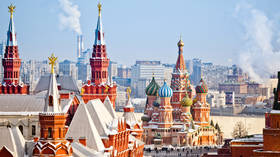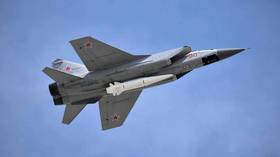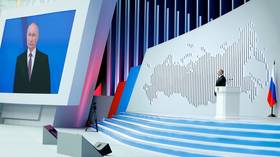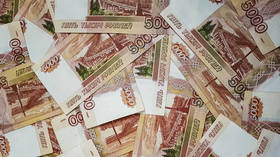Sovereignty, US hypocrisy, nuclear warnings: Key takeaways from Putin’s Federal Assembly address
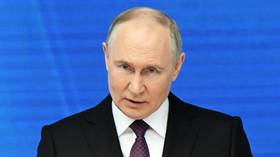
Russian President Vladimir Putin has addressed the Federal Assembly, the country’s national legislature, detailing plans for the future development of the nation as well as its strategic goals. His speech, which set a duration record, comes just two weeks ahead of the country’s presidential election, in which Putin is seeking another term.
In his two-hour-and-six-minute address, he reflected on the international geopolitical agenda but spent most of his time focusing on domestic issues. He announced five new national projects, set a number of goals for 2030 and proposed several tax reforms, as well as other socio-economic initiatives.
Below are some of the highlights from his speech.
Russia will overcome attempts to constrain it
The president stated that Russia has proven that it is capable of solving the most difficult problems and challenges, has been able to repel “the aggression of international terrorism” and preserve national unity, despite Western attempts to tear Russia apart like it did Ukraine and to turn it into a “dependent, fading, dying space where they can do whatever they want” by sowing national conflicts.
Moving forward, the president stressed that Russia will continue to defend its freedom, preserve its history and traditions, further develop its democratic institutions and protect its sovereignty, not allowing anyone to interfere in its internal affairs.
Russia’s military potential
Russia’s combat capabilities have significantly grown over the past several years, as its forces have gained enormous combat experience and a new generation of talented commanders has emerged who are able to competently carry out their missions, use new equipment and solve diverse tasks.
The country’s strategic nuclear forces have also been modernized with the latest hypersonic technology, Putin said, adding that they will continue to be equipped with increasingly effective weaponry.
The president also reported the Burevestnik unlimited-range cruise missile and the Poseidon unmanned underwater vehicle were being completed while the first Sarmat heavy ballistic missiles have already been delivered to Russia’s troops and will soon be “demonstrated in operations deployment areas.”
Dialogue with the US
Russia remains open for dialogue with the US on issues of strategic stability, but accuses Washington of hypocrisy in its dealings with Moscow, Putin remarked, as it openly calls for Russia’s strategic defeat on the battlefield, aiming to turn it into a “withering space” like it did with Ukraine.
“We are dealing with a country whose leaders are openly taking hostile actions against us,” Putin said, claiming that “in place of Russia, they want a dependent, withering, dying space, where they can do whatever they want.”
The president also stated that the West is trying to drag Russia into an arms race and stressed the importance of developing the country’s defense-industrial complex, in a rational manner that serves to increase the scientific, technological and industrial potential of the country.
The NATO threat
The president said it was crucial to strengthen Russia’s forces along the Western border in order to neutralize threats associated with the next NATO expansion to the east and the involvement of Sweden and Finland in the alliance.
“The West provoked conflicts in Ukraine, the Middle East, and other regions of the world and continues to lie. Now, without any embarrassment, they declare that Russia allegedly intends to attack Europe,” Putin said, calling such allegations “some kind of nonsense.”
He added that the US and its satellites have effectively “dismantled the European security system” and are now trying to scare the world with threats of a nuclear conflict that would end human civilization.
“Russophobia, like other ideologies of racism, national superiority and exclusivity, indeed blinds and deprives one of reason,” Putin surmised, stressing that the actions of the West “create risks for everyone.”
BRICS and collapsing monopolies
Russia strives to unite the efforts of the world as new global economic challenges emerge amid the collapse of former monopolies, Putin said, noting that the G7 group has already fallen behind BRICS countries in its share of global GDP.
“Such global trends cannot be avoided,” Putin said, adding that Russia, together with friendly states from the Middle East, Asia, Africa and Latin America, will continue to build a new global financial architecture free from political interference, while the West discredits its own currencies and banking systems.
Russia is a stronghold of traditional values
Putin noted that while some Western countries are “deliberately destroying moral norms and family institutions” and pushing their nations towards extinction, Russia chooses life and remains a stronghold of traditional values on which humanity is built.
“Our choice is shared by most people in the world, including millions of citizens of Western countries,” he said.
Declining birth rates
The president admitted that Russia, like many other countries, is faced with a decline in birth rates and suggested that all levels of government, civil society, and pastors of traditional religions should work together to make large families with many children the social norm, the philosophy of social life and a guideline of the state strategy.
In order to achieve a sustainable growth of birth rates over the next six years, Putin said Russia will focus on supporting and improving the quality of life of the family, by extending the maternity capital program to 2030 and offering more financial benefits, such as tax deductions, to families with multiple children.
National projects
Supporting families at the federal level will be one of five new national projects, Putin announced. The first one, dubbed ‘Family,’ will focus on boosting birthrates and improving the quality of life of families with children.
The ‘Russia’s Youth’ and ‘Personnel’ projects will focus on education and employment in order to the secure the future of the country by increasing payments to schools and teachers, particularly those in small cities, towns and villages, modernizing kindergartens, schools and universities in order to strengthen the connection between all levels of education, as well as working with employers to help young people find jobs.
Putin also announced the “Long and Active Life” project, which would aim to increase the average life expectancy in Russia to at least 78 years by 2030. This initiative will include the construction of sports facilities, modernizing and building more healthcare clinics, as well as tax deductions for those who undergo regular medical examinations.
The fifth project, called “Data Economy” will focus on investing some 700 billion rubles ($7.6 billion) over the next six years into creating digital platforms in all sectors of the economy and social sphere, increasing the capacity of domestic supercomputers by a factor of at least ten by 2030, and providing high-speed internet access to almost the entire country within the next decade.
Other issues
Outside of what falls under the scope of the five new national projects, Putin also addressed the importance of tackling issues such as tax reforms, which would ensure a “fairer distribution of the tax burden” towards those with higher personal and corporate incomes, and would provide incentives for small businesses.
The government should also continue the implementation of the federal “Clean Water” project, which should focus on minimizing the volume of harmful emissions into the atmosphere and on the pollution of water.
Russia will also strive to increase the contribution of tourism to the country’s GDP to 5% by 2030 and raise the tourist flow to 140 million visits per year, Putin said. To this end, the government will launch a long-term program for the preservation of cultural heritage sites and allocate additional funds for the improvement of historical city centers.
